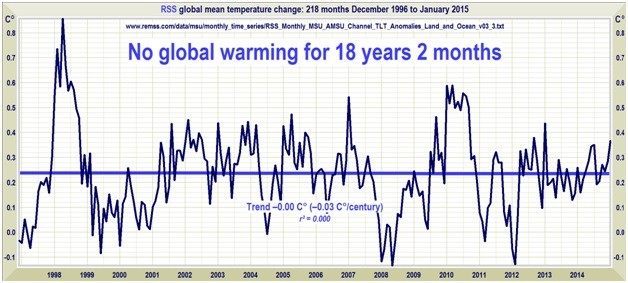The Royal Society has misrepresented current thinking on climate change by presenting new theories as established facts and leaving out evidence that doesn’t support man made global warming dogma, a group of climate scientists has claimed.
In December, the Royal Society published a Short Guide to Climate Science, which it presented as a definitive guide to all things climate science. It asks and answers 20 questions, some of which display clear bias within the phrasing of the question, such as “How do scientists know that recent climate change is largely caused by human activities?” and “Climate is always changing. Why is climate change of concern now?”
In response, the Global Warming Policy Foundation (GWPF) has produced The Small Print – What the Royal Society Left Out, in order to bring balance to the evidence base. It takes the Royal Society’s original 20 questions in turn and present a “fuller picture” on each.
For example, in response to the question “What role has the Sun played in climate change in recent decades?”, The Royal Society says “The Sun has not played a major role in recent climate change. The Sun provides the primary source of energy driving Earth’s climate system and variations in the energy emitted by the Sun affect Earth’s climate. However, satellite measurements since the late 1970s show no overall increase in the energy emitted by the Sun, while the climate system has warmed.”
But the GWPF refutes this answer as too simplistic, saying: “It is frequently claimed that the Sun has not played a major role in recent climate change because the overall energy emitted by the sun has changed little. This is simplistic. There is significant evidence that the Sun has played an important role in climate change, and over the 20th century in particular.
“Quantifications of these changes suggest forcing comparable to anthropogenic forcing. While variability of total solar irradiance may be small, variability of specific components of solar output can be large, and some of these are believed to affect the climate through mechanisms other than direct heating, for example by influencing cloud formation. These effects are a matter of current inquiry.”
The contents of the Royal Society’s report is not the only criticism that the GWPF has of the document. “The authors who wrote the guide were not identified. Nor were the members of the Royal Society asked whether they endorsed it or not. […] We have no way of knowing how many Royal Society Fellows actually agree with it,” Prof Ross McKitrick, the chairman of the GWPF’s Academic Advisory Council said. By contrast, the GWPF lists all thirteen authors of its report, all of whom endorse the contents.
This weekend, a fellow of the Royal Society confirmed that the organisation, which enjoys a presitigious history stretching back over 350 years, displayed “selectivity” when presenting evidence on the climate change debate.
“I produced a paper that urged the Society’s council to distance itself from the levels of certainty being expressed about future warming,” Prof Michael Kelly said. “I said it ought at least to have a ‘plan B’ if the pause should last much longer, so calling the models into still more serious question. I got a polite brush-off.”
Prof McKitrick said “many commentators were concerned that the [Royal Society’s] guide was profoundly misleading, misrepresenting major points while overlooking some of the key issues and question marks over the science, glossing over them as if they were of little consequence.
“In a time of universal overconfidence, to be willing to state what is not known is an essential, albeit controversial, duty of scientists.
“[Our] report attempts to give a more accurate picture of climate science and to add in the caveats and to explain the gaps in our knowledge over which the Royal Society guide drew a veil.
“The Royal Society, quite properly, does not draw policy conclusions from the meager science they present (and misrepresent), but they, most assuredly, know that others will.”

COMMENTS
Please let us know if you're having issues with commenting.